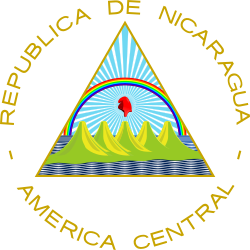 |
|---|
Visitors to Nicaragua must obtain a visa from one of the Nicaraguan diplomatic missions, unless they come from one of the visa exempt countries or countries that can obtain a visa on arrival. All visitors must hold a passport valid for 6 months.
 |
|---|
Visitors to Nicaragua must obtain a visa from one of the Nicaraguan diplomatic missions, unless they come from one of the visa exempt countries or countries that can obtain a visa on arrival. All visitors must hold a passport valid for 6 months.

Holders of passports of the following jurisdictions can visit Nicaragua without a visa for up to 90 days (unless otherwise noted). [1]
All visitors must hold proof of sufficient funds to cover their stay and documents required for next destination. Extension of stay is possible for additional 30 days for a fee.
ID - May also enter with an ID card if come from a country that is part of the CA-4 Agreement.
1 - 30 days
| Date of visa changes | ||
|---|---|---|
Cancelled: | ||
A visa is not required for a maximum stay of 90 days within 180 days for valid visa holders or residents of Canada, the European Union member states, or the United States. This does not apply to nationals of China and Iran.
Holders of diplomatic, official or service passports of Bolivia, Colombia, China, Dominica, Egypt, Grenada, Guyana, India, Jamaica, Japan, Kazakhstan (30 days), Kenya, Malaysia, Montenegro, Morocco, Papua New Guinea (30 days), Peru, Philippines, Serbia (30 days), Singapore, Suriname and Thailand do not require a visa for a maximum stay of 90 days (unless otherwise stated).
Citizens of the following countries and territories can visit Nicaragua by obtaining a visa on arrival up to 90 days:
Nationals of Afghanistan, Albania, Armenia, Bangladesh, Bosnia and Herzegovina, Botswana, Republic of the Congo, Democratic Republic of the Congo, Eritrea, Iraq, Laos, Liberia, Libya, Mali, Mongolia, Nepal, Nigeria, Sierra Leone, Somalia, Sri Lanka, Sudan, Syria, Timor-Leste, and Yemen or ordinary passport holders issued by Cameroon, Haiti, India, Kenya, Pakistan, and Vietnam are granted a visa on arrival for US$50 provided the passport contains a credible US, Canada or Schengen visa.
Transit without a visa is allowed for travellers who normally require a visa but are transiting within 24 hours and hold onward tickets.
This does not apply to nationals of Afghanistan, Albania, Armenia, Bangladesh, Bosnia and Herzegovina, Botswana, Cameroon, China, Republic of the Congo, Democratic Republic of the Congo, Cuba, Eritrea, Haiti, India, Iraq, Kenya, Laos, Lebanon, Liberia, Mali, Mongolia, Nepal, Nigeria, Pakistan, Sierra Leone, Somalia, Sri Lanka, Sudan, Syria, Timor-Leste, Vietnam and Yemen.
Nationals from all visa-exempt countries are required to obtain a tourist card (US$10) on arrival. Exempt are the citizens of El Salvador, Guatemala, and Honduras, as well as holders of diplomatic, official, service or special passports issued to any country.
The Central America-4 Border Control Agreement is a treaty between Guatemala, El Salvador, Honduras and Nicaragua. A visa issued by one of the four countries is honored by all four of the countries.
The time period for the visa, however, applies to the total time spent in any of the four countries without leaving the CA-4 area. [9]
Most visitors arriving to Nicaragua were from the following countries of nationality: [10]
| Country | 2015 | 2014 | 2013 |
|---|---|---|---|
| 276,767 | 263,927 | 273,015 | |
| 275,406 | 267,320 | 243,039 | |
| 167,448 | 146,071 | 163,758 | |
| 155,701 | 143,303 | 150,963 | |
| 90,296 | 85,283 | 94,957 | |
| 35,260 | 39,370 | 33,832 | |
| 22,223 | 24,553 | 24,676 | |
| 19,030 | 15,666 | 14,947 | |
| 17,392 | 16,155 | 13,936 | |
| 14,737 | 15,596 | 10,604 | |
| Total | 1,386,481 | 1,329,663 | 1,229,410 |
{{cite web}}: CS1 maint: archived copy as title (link)